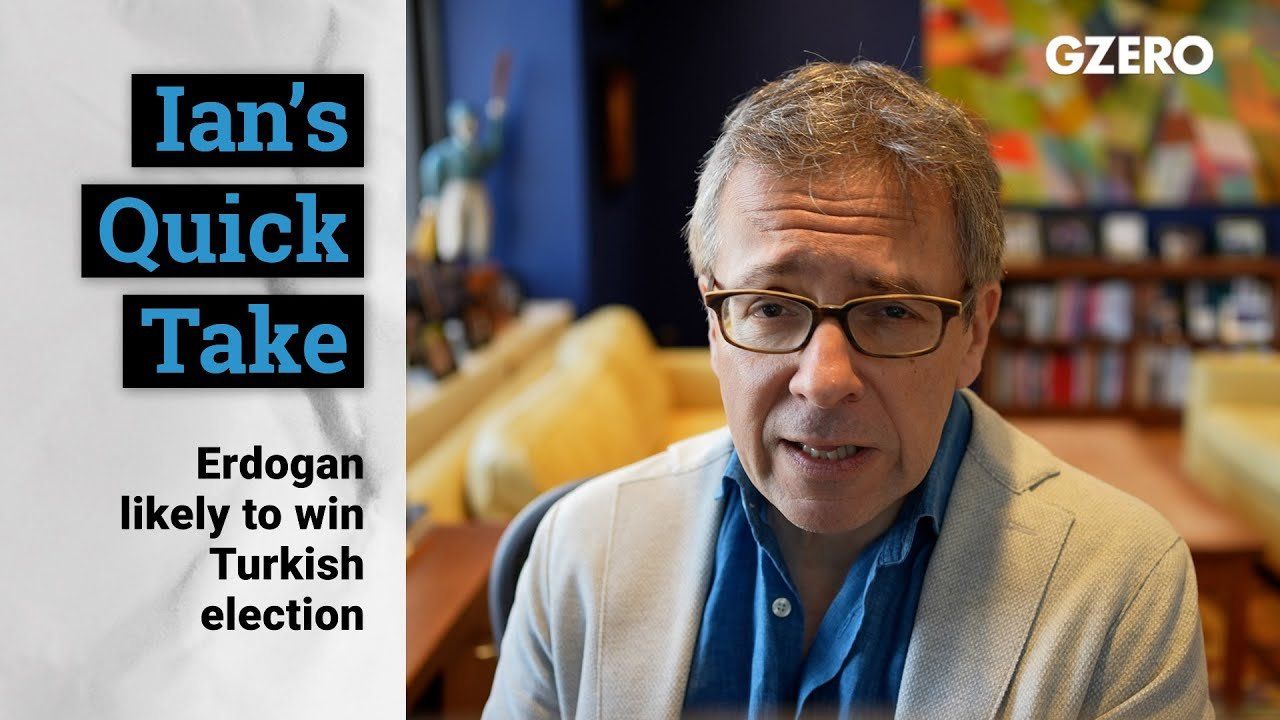Quick Take
Erdogan likely to win Turkish election

Erdogan likely to win Turkish election | Quick Take | GZERO Media

Ian Bremmer's Quick Take: Hi everybody, Ian Bremmer here, and a Quick Take to kick off your week. Beautiful Monday morning in New York. And elections, important elections in Turkey. We've been talking about them for a while, and the first round, results are now in. Erdogan not quite at 50%, but really close. You're going to have a second round, but it's almost certain now that he is going to win. Turnout's very high, almost 90%. That seems unheard of, inconceivable for Americans or Europeans, but actually normal turnout in Turkish elections are about 85%, higher this time around because a lot was at stake. You had consolidation around a single major opposition candidate and a lot of people unhappy with the economy, but a lot of nationalism at play too.
Also, keep in mind that Erdogan has a lot of structural advantages using the judiciary to go after and even disqualify some of the candidates that he didn't like, control of the media, almost all of which is either directly state-owned or state-aligned, and some level of influence over social media. You may have seen Twitter taking some lumps over the last few days because they were demanded to remove some pro-opposition content just literally 24 hours before the first round elections. Twitter complied. And that also, of course, has an impact at the margins. But what we're going to see here is consistency, is a leader who now has been working hard to undermine the Democratic checks and balances on his rule, some significant and credible claims of corruption, and also the ability to play a balancing role geopolitically between the United States and Europe and Russia. And that's despite the fact that Turkey is a NATO member. Geopolitically, Turkey's role has been increasing as we see more fragmentation more broadly in the region.
They have managed to improve and rebuild their relations with core Gulf states, for example, they've managed to stabilize their relationship with Syria to a degree, especially a place they've had a lot of fighting on the ground, and they've also played one of the few diplomatic roles of moderation between Russia and Ukraine. Now, one of the big stories that we've seen from Turkey internationally over the past months was their willingness to veto potentially a Swedish accession into NATO. Now that this election is going to be over in two weeks, and again, I think at this point, Erdogan is basically a layup, even a slam dunk, at that point, I think that Sweden, their objections will be removed, you will have that additional accession into NATO.
But they expect in return not only some support from Sweden in terms of the way that would-be Kurdish nationalists are treated on the ground inside that country, but also they expect a reduction of sanctions from the United States, which would also allow the Turks to purchase advanced fighter jets that they want, that are aligned and interoperable with other existing systems they have as a NATO ally, but that Washington has been unwilling to provide. I expect all that's going to happen. So Erdogan is not going to become a closer friend to the West, he will continue to be the most obstreperous of NATO allies, continue to look to use geopolitics in his favor, continue to undermine Turkish democracy, erode its institutions, month after month, year after year. And as well, the Turkish economy is in a hell of a lot of trouble. But the fact is that he was still able to pick up that election.
And final point I'd make here is that we didn't see significant shenanigans in the actual vote count itself. In the early measures, early hours of the day, the opposition was coming out with results that very much favored them, and they did that despite the fact that they hadn't been confirmed yet. While the government was contesting outcomes and they waited until those outcomes were confirmed, the interesting point here is that as we saw the final results from district to district, both opposition, as well as government, basically aligned on the same outcome. And Erdogan did say that he would accept the outcome no matter what. Frankly, that's more than Trump would do in his CNN Town Hall last week. So at the end of the day, there are structural challenges with making it an unfair election, but you would say that the election was free, and that's more than a lot of people might have presumed even a few weeks ago.
Think you know what's going on around the world? Here's your chance to prove it.
At the 62nd Munich Security Conference, GZERO’s Tony Maciulis spoke with Benedikt Franke, Vice Chairman and CEO of the Munich Security Conference, to discuss whether the post-1945 global order is under strain or already unraveling.
At the Munich Security Conference, the mood is clear: Europe no longer assumes the United States will lead. In this Quick Take, Ian Bremmer reports from Munich, where this year’s theme, “Under Destruction,” reflects growing anxiety that the US itself is destabilizing the transatlantic alliance it once anchored.